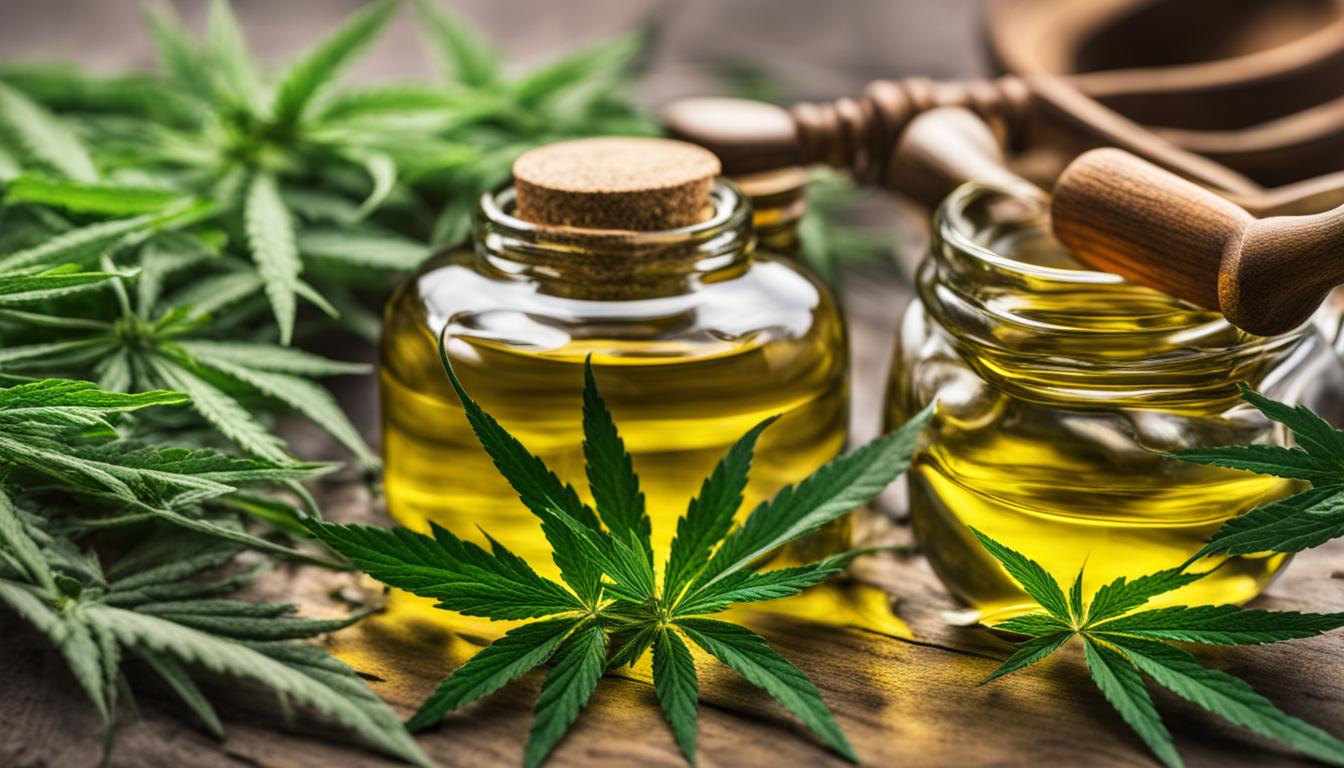Decoding the Differences: CBD Oil vs. Hemp Seed Oil vs. Marijuana
Welcome to our comprehensive guide on the key differences between CBD oil, hemp seed oil, and marijuana. In the ever-expanding world of cannabis-derived products, it's essential to understand the distinctions to make informed choices. With the increasing popularity of CBD oil and hemp seed oil, confusion often arises, leading many to wonder what sets them apart from marijuana and each other. Join us as we unravel the intricacies of these three substances and explore their unique characteristics.
Key Takeaways:
- CBD oil, hemp seed oil, and marijuana have distinct differences and applications.
- CBD oil offers potential therapeutic benefits due to its anti-inflammatory properties and B-complex vitamins and amino acids.
- Hemp seed oil is rich in omega-3 and omega-6 fatty acids, vitamins, and minerals, making it beneficial for skincare and overall nutrition.
- Understanding the disparities between CBD oil, hemp seed oil, and marijuana is crucial to avoid misleading marketing and to choose the right product for your needs.
- Consider personal preferences, desired outcomes, and product quality when selecting between CBD oil and hemp seed oil.
What is CBD oil?
CBD oil, also known as cannabidiol oil, is a natural compound derived from the hemp plant. Unlike marijuana, which contains the psychoactive compound THC, CBD oil does not produce a high. Instead, it offers a range of potential therapeutic benefits.
One of the main advantages of CBD oil is its anti-inflammatory properties. It has been shown to reduce inflammation in the body, which can help alleviate symptoms of various conditions, including chronic pain, arthritis, and autoimmune disorders.
Furthermore, CBD oil may have a positive impact on mental health. Research suggests that it can help reduce anxiety and depression, promoting a sense of calm and well-being. It is believed to do so by interacting with the body's endocannabinoid system, which plays a role in regulating mood, sleep, and stress responses.
Additionally, CBD oil contains B-complex vitamins and amino acids that are beneficial for overall health. These nutrients support various bodily functions, including metabolism, energy production, and immune system functioning.
Potential benefits of CBD oil:
- Reducing inflammation
- Alleviating chronic pain
- Managing symptoms of anxiety and depression
- Promoting a sense of calm and well-being
- Supporting overall health with B-complex vitamins and amino acids
The Uses and Benefits of CBD Oil
When it comes to the uses and benefits of CBD oil, the possibilities are vast. CBD oil is known for its potential therapeutic effects, making it a popular choice for individuals seeking alternative remedies. One of the main benefits of CBD oil is its ability to reduce inflammation in the body. This can be particularly beneficial for those dealing with chronic pain, arthritis, or autoimmune conditions.
In addition to its anti-inflammatory properties, CBD oil has been found to provide pain relief. Many individuals turn to CBD oil as a natural alternative to traditional pain medications, as it may help alleviate discomfort without the potential side effects associated with pharmaceutical drugs.
Furthermore, CBD oil has been shown to promote a sense of well-being and reduce stress and anxiety. It can help individuals feel more relaxed and calm, making it beneficial for those dealing with anxiety disorders or daily stressors. Additionally, CBD oil has shown promise in managing seizures, particularly in individuals with epilepsy. However, further research is needed to understand its effectiveness for different medical conditions.
| Benefits of CBD Oil: |
|---|
| Reduces inflammation |
| Provides pain relief |
| Promotes a sense of well-being |
| Helps manage seizures |
Overall, CBD oil offers a wide range of potential benefits. Whether it's reducing inflammation, alleviating pain, or promoting a sense of well-being, CBD oil has garnered attention for its therapeutic potential. However, it's important to note that individual experiences may vary, and consulting with a healthcare professional is advised before incorporating CBD oil into your routine.
CBD Oil Risks and Side Effects
When considering the use of CBD oil, it's important to be aware of potential risks and side effects. While CBD oil is generally well-tolerated, it can cause some mild adverse effects in certain individuals. These side effects are typically temporary and subside on their own.
One common side effect of CBD oil is dry mouth. This can occur due to the interaction of CBD with the receptors in the salivary glands, which can reduce saliva production. Additionally, CBD oil may cause digestive issues such as diarrhea or reduced appetite in some individuals.
Another possible side effect of CBD oil is drowsiness and fatigue. This can be more common in higher doses or when CBD is taken alongside other medications that have sedative effects. It's important to be cautious about driving or operating heavy machinery if experiencing these side effects.
| Side Effects of CBD Oil | Prevalence |
|---|---|
| Dry mouth | Common |
| Diarrhea | Common |
| Reduced appetite | Common |
| Drowsiness and fatigue | Less common |
It's crucial to consult with a healthcare professional before starting CBD oil, especially if you have any underlying medical conditions or are taking other medications. They can provide personalized advice and guidance based on your specific needs and circumstances. Additionally, it's essential to choose high-quality CBD oil products that have undergone third-party testing to ensure purity and accurate dosage.
Overall, while CBD oil offers various potential benefits, it's important to weigh the risks and benefits before incorporating it into your routine. By being informed and making responsible choices, you can maximize the benefits of CBD oil while minimizing any potential side effects.
What is Hemp Seed Oil?
Hemp seed oil is a natural oil derived from the seeds of the hemp plant, Cannabis sativa. Unlike CBD oil or marijuana, hemp seed oil contains no CBD or THC, the psychoactive component of cannabis. It is important to note that while hemp seed oil and CBD oil are both derived from the same plant, they have distinct differences in terms of composition and uses.
Hemp seed oil is known for its nutritional benefits. It is rich in omega-3 and omega-6 fatty acids, which are essential for maintaining a healthy body. These fatty acids play a crucial role in supporting brain and heart health, reducing inflammation, and promoting overall well-being.
Additionally, hemp seed oil is widely used in skincare products. It is known for its moisturizing properties and ability to soothe and nourish the skin. The oil's anti-inflammatory properties can help reduce redness and irritation, making it a popular choice for individuals with sensitive skin or conditions like psoriasis and acne.
The Nutritional Benefits of Hemp Seed Oil
| Nutrient | Amount per 100g |
|---|---|
| Omega-3 fatty acids | 27.6g |
| Omega-6 fatty acids | 55.4g |
| Vitamin E | 0.5mg |
| Vitamin B6 | 0.1mg |
| Magnesium | 483mg |
Hemp seed oil is a nutritious oil that provides a range of health benefits. Its high omega-3 and omega-6 fatty acid content makes it a great addition to a balanced diet. Additionally, its use in skincare products can help moisturize and soothe the skin, promoting a healthy complexion.
Uses of Hemp Seed Oil
- Moisturizer: Apply hemp seed oil topically to hydrate and nourish the skin.
- Cooking: Use hemp seed oil as a healthy alternative to other cooking oils. It has a nutty flavor that adds depth to your dishes.
- Haircare: Massage hemp seed oil into the scalp to promote hair growth and strengthen the hair shaft.
- Supplement: Take hemp seed oil as a daily supplement to support brain and heart health, reduce inflammation, and promote overall well-being.
The Uses and Benefits of Hemp Seed Oil
When it comes to natural skincare and overall wellness, hemp seed oil offers a multitude of uses and benefits. This versatile oil is derived from the seeds of the hemp plant and has gained popularity for its nourishing properties and potential health advantages.
Hemp seed oil is a rich source of essential fatty acids, including omega-3 and omega-6, which are known for their anti-inflammatory effects and ability to nourish the skin from within. These fatty acids can help reduce inflammation and promote a healthy complexion, making hemp seed oil a valuable addition to any skincare routine.
In addition to its skincare benefits, hemp seed oil has also been found to support brain and heart health. The omega-3 fatty acids in hemp seed oil are crucial for cognitive function and can help support healthy brain development. Furthermore, the oil's high content of gamma-linolenic acid (GLA) has been linked to cardiovascular health and may contribute to reducing the risk of heart disease.
Moreover, hemp seed oil shows promise in soothing various skin conditions, including psoriasis and acne. Its natural anti-inflammatory properties can help calm irritated skin and reduce redness, while its moisturizing effects can hydrate and nourish dry skin. The oil's lightweight texture and non-comedogenic nature make it suitable for all skin types, including oily and acne-prone skin.
Hemp Seed Oil Benefits:
- Promotes healthy skin and reduces inflammation
- Supports brain health and cognitive function
- Aids in maintaining cardiovascular health
- Soothes skin conditions like psoriasis and acne
With its numerous uses and potential benefits, hemp seed oil is a natural and versatile option for those seeking to enhance their skincare routine and support overall well-being.
Hemp Seed Oil Risks and Side Effects
In this section, we will discuss the potential risks and side effects associated with hemp seed oil. While hemp seed oil is generally considered safe for most people, it is important to be aware of possible adverse reactions. As with any supplement or skincare product, individual experiences may vary, and it is always recommended to consult with a healthcare professional before incorporating hemp seed oil into your routine.
Hemp Seed Oil Risks:
Although rare, some individuals may experience mild allergic reactions to hemp seed oil. Symptoms may include skin irritation, itching, or redness. If you have known allergies to hemp, cannabis, or other seeds, it is advisable to perform a patch test before applying hemp seed oil topically or ingesting it.
Hemp Seed Oil Side Effects:
Hemp seed oil is generally well-tolerated, but some people may experience mild side effects. These can include drowsiness, especially when taken in larger doses, and temporary dry mouth. It is important to note that these side effects are typically mild and resolve on their own.
Interactions with Medications:
Hemp seed oil may interact with certain medications, particularly those metabolized by the liver. If you are taking prescription medications, it is crucial to consult with your doctor or pharmacist before using hemp seed oil. They can provide guidance on potential interactions and help ensure the safe use of both your medication and hemp seed oil.
| Risks | Side Effects | Interactions with Medications |
|---|---|---|
| Allergic reactions | Drowsiness | Potential interactions with liver-metabolized medications |
| Symptoms may include skin irritation, itching, or redness | Temporary dry mouth | Consult with a doctor or pharmacist before use |
It is worth noting that hemp seed oil is not intended to diagnose, treat, cure, or prevent any disease, and its benefits and potential risks may vary among individuals. It is always recommended to conduct thorough research, consult with healthcare professionals, and carefully read product labels before using hemp seed oil.
Differences Between Hemp and Marijuana
When it comes to understanding the differences between hemp and marijuana, one of the key factors to consider is the legality of each plant. While marijuana is classified as a Schedule I controlled substance in the United States, hemp is legal under federal law. This means that hemp-derived CBD oil is legal in most places, while the legality of marijuana-based CBD oil varies by state.
Another important distinction is the level of THC (tetrahydrocannabinol), the psychoactive compound responsible for the “high” associated with marijuana. Hemp contains minimal THC, typically less than 0.3%, while marijuana can have much higher levels, ranging from 5% to 30% or more. This difference in THC content is what separates hemp (non-psychoactive) from marijuana (psychoactive).
“Hemp contains minimal THC, typically less than 0.3%, while marijuana can have much higher levels, ranging from 5% to 30% or more.”
Furthermore, hemp and marijuana differ in their physical appearance and cultivation practices. Hemp plants are tall and slender with fewer branches and are grown for their fiber and seeds. On the other hand, marijuana plants are bushier, shorter, and are cultivated for their high THC content. It's important to note that although hemp and marijuana are both members of the Cannabis sativa species, they are distinct varieties bred for different purposes.
Table: Differences Between Hemp and Marijuana
| Aspect | Hemp | Marijuana |
|---|---|---|
| Legal Status | Legal under federal law | Illegal under federal law (varies by state) |
| THC Content | Less than 0.3% | Varies, typically higher than 0.3% |
| Physical Appearance | Tall, slender, fewer branches | Bushy, shorter, more branches |
| Cultivation Purpose | Fiber and seed production | High THC content |
Understanding the distinctions between hemp and marijuana is crucial, especially when it comes to legal compliance and choosing the right products for your needs. While hemp-derived CBD oil provides therapeutic benefits without the psychoactive effects of marijuana, marijuana-based CBD oil may have legal restrictions and a higher risk of THC intoxication. It's important to consult local regulations and make informed decisions when using products derived from cannabis plants.
The Problem with Mixing Up Hemp Seed Oil and CBD Oil
Understanding the differences between hemp seed oil and CBD oil is crucial, as confusing these two can lead to potential harm and misinformation. While both oils offer unique benefits, their compositions and uses vary significantly.
The Key Differences:
- Hemp seed oil is derived from the seeds of the hemp plant and does not contain CBD or THC, the psychoactive compound found in marijuana.
- CBD oil, on the other hand, is extracted from the flowers, leaves, and stalks of the hemp plant and contains significant amounts of CBD, but only trace amounts of THC.
Although both oils may have health benefits, they serve different purposes. Hemp seed oil is primarily used for its nutritional value and skincare benefits, while CBD oil is renowned for its potential therapeutic effects, such as reducing inflammation and alleviating pain.
“Misleading labeling practices and inaccurate marketing can further confuse consumers, causing them to unwittingly purchase the wrong product for their intended purposes.”
One of the main problems with mixing up these oils is the prevalence of misleading labeling practices and inaccurate marketing. Many brands may falsely claim that hemp seed oil has the same benefits as CBD oil, leading consumers to believe that they are purchasing a product with potential therapeutic properties, when in reality, they are only obtaining a nutritional supplement.
| Hemp Seed Oil | CBD Oil |
|---|---|
| Derived from the seeds of the hemp plant | Extracted from the flowers, leaves, and stalks of the hemp plant |
| Contains no CBD or THC | Contains significant amounts of CBD and trace amounts of THC |
| Nutritional benefits, skincare uses | Potential therapeutic effects, anti-inflammatory properties |
To avoid confusion and ensure that you are purchasing the right product, it is essential to carefully read the labels and look for key indicators. CBD oil should clearly state the amount of CBD it contains, while hemp seed oil should indicate its source as being derived from hemp seeds. Additionally, third-party testing and reputable brands can offer peace of mind, as they provide transparency and guarantee the purity and quality of the product.
By understanding the clear distinctions between hemp seed oil and CBD oil, consumers can make informed decisions and reap the benefits of these oils according to their individual needs and goals.
Hemp Seed Oil vs. CBD Oil: Which Is Better?
When it comes to choosing between hemp seed oil and CBD oil, it ultimately depends on your individual preferences and goals. Both oils have their own unique benefits and applications, and the decision should be based on what you're looking to achieve. Let's take a closer look at the differences and uses of each.
Hemp Seed Oil
Hemp seed oil is derived from the seeds of the hemp plant and does not contain CBD or THC. It is rich in omega-3 and omega-6 fatty acids, as well as vitamins and minerals, making it a popular choice for nutritional support. Additionally, hemp seed oil has moisturizing and anti-inflammatory properties, which make it beneficial for skincare.
Some common uses of hemp seed oil include:
- Moisturizing and nourishing the skin
- Reducing inflammation
- Supporting brain and heart health
- Improving cognitive function
- Soothing skin conditions like psoriasis and acne
CBD Oil
CBD oil, on the other hand, contains cannabidiol (CBD) extracted from the flowers, leaves, and stalks of the hemp plant. It is known for its potential therapeutic effects, including reducing inflammation, providing pain relief, and promoting a sense of well-being. CBD oil has gained popularity for its potential use in managing seizures and various medical conditions.
Some of the benefits associated with CBD oil include:
- Reducing inflammation
- Providing pain relief
- Promoting a sense of well-being
- Managing seizures
- Further research is needed to determine its effectiveness for different medical conditions.
When choosing between hemp seed oil and CBD oil, it's important to consider your specific needs and desired outcomes. Whether you're looking for nutritional support or potential therapeutic effects, make sure to choose high-quality products and carefully read product labels to ensure you're getting the right option for you.
How to Choose the Right Option for You
When it comes to choosing between hemp seed oil and CBD oil, understanding your individual needs and goals is key. Both options offer unique benefits and applications, so it's important to consider what you're looking to achieve.
If you're primarily interested in skincare benefits, hemp seed oil may be the better choice. With its moisturizing and anti-inflammatory properties, hemp seed oil can help nourish and soothe the skin. It's rich in omega-3 and omega-6 fatty acids, vitamins, and minerals, making it a natural option for maintaining healthy skin.
On the other hand, if you're seeking potential therapeutic effects, CBD oil may be the way to go. CBD oil is known for its anti-inflammatory properties and has the potential to provide pain relief and promote a sense of well-being. It's also being studied for its effectiveness in managing seizures and may have other medical applications.
Regardless of your choice, it's essential to select high-quality products that are properly dosed. Look for organic options that have been third-party tested to ensure purity and avoid additives or flavorings. Consulting with healthcare professionals can also provide valuable guidance in determining the most suitable option for you.
Take the time to explore the differences between hemp seed oil and CBD oil and consider your personal needs and goals. Whether you're looking for skincare benefits or potential therapeutic effects, both options offer unique advantages. By choosing the right product and using it correctly, you can harness the benefits of hemp seed oil or CBD oil to enhance your well-being.
Conclusion
In conclusion, understanding the differences between CBD oil, hemp seed oil, and marijuana is crucial when it comes to making informed choices. CBD oil offers potential therapeutic effects, including reducing inflammation and providing pain relief. On the other hand, hemp seed oil is a nutritious option, rich in omega-3 and omega-6 fatty acids.
It is important to note that hemp seed oil does not contain CBD or THC, unlike CBD oil, which can have psychoactive properties. While both oils have their own benefits and applications, the choice between them depends on individual needs and goals.
When selecting a product, it is essential to opt for high-quality options and check product labels for accurate information. Whether you are looking for skincare benefits, nutritional support, or therapeutic effects, choosing the right option for you will ensure you can reap the maximum benefits.
FAQ
What is the difference between CBD oil, hemp seed oil, and marijuana?
CBD oil is derived from the cannabis plant and contains cannabidiol (CBD), which has potential therapeutic effects. Hemp seed oil is derived from the seeds of the hemp plant and does not contain CBD or THC. Marijuana is a cannabis plant that contains varying levels of THC, the psychoactive compound.
What are the benefits of CBD oil?
CBD oil has been shown to have anti-inflammatory properties, provide pain relief, promote a sense of well-being, and potentially manage seizures. It also contains B-complex vitamins and amino acids.
What are the potential side effects of CBD oil?
The potential side effects of CBD oil may include dry mouth, diarrhea, reduced appetite, drowsiness, and fatigue. It is important to consult with a doctor before trying CBD oil and to choose third-party tested products for purity and accurate dosage.
What are the benefits of hemp seed oil?
Hemp seed oil is rich in omega-3 and omega-6 fatty acids, vitamins, and minerals. It promotes healthy skin, reduces inflammation, and supports brain and heart health. It can also improve cognitive function and soothe skin conditions like psoriasis and acne.
Are there any risks or side effects of using hemp seed oil?
Hemp seed oil is generally safe to use but may cause drowsiness and dry mouth. It is important to choose organic and third-party tested products to ensure purity and avoid additives or flavorings. Hemp seed oil can also interact with medications, so consulting with a healthcare professional is recommended.
What is the difference between hemp and marijuana?
Hemp contains minimal levels of THC, the psychoactive compound, and is legal in most places. Marijuana is known for its psychoactive effects and may have legal restrictions.
Why is it important to understand the differences between CBD oil and hemp seed oil?
Understanding these distinctions is important to avoid misleading labeling and false claims made by some brands. It ensures that consumers can make informed decisions and choose the right option based on their personal needs and goals.
How do I choose between hemp seed oil and CBD oil?
The choice between hemp seed oil and CBD oil depends on individual preferences and goals. Both oils have their own benefits and applications. It is important to consider factors such as skincare benefits, nutritional support, and potential therapeutic effects when making a decision. Choosing high-quality products and checking product labels is also crucial.
What are the key points to consider when choosing between hemp seed oil and CBD oil?
When choosing between hemp seed oil and CBD oil, it is important to consider individual needs such as skincare benefits, nutritional support, and potential therapeutic effects. Choosing high-quality and properly dosed products is also essential for optimal results.
Source Links
- https://gaeahealth.co/blogs/news/hemp-oil-vs-cbd-oil-decoding-the-differences-and-choosing-the-right-option-for-you
- https://www.wiseapetea.com/blogs/knowledge/hemp-seed-oil-versus-cbd-oil-understanding-the-differences-and-benefits
- https://www.wellandgood.com/hemp-oil-vs-cbd-oil/











Leave a Reply